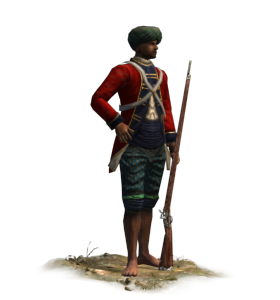Difference between revisions of "Sepoys (ETW Unit)"
Fire-dweller (talk | contribs) m (moved Sepoys (ETW Unit to Sepoys (ETW Unit)) |
Fire-dweller (talk | contribs) |
||
| Line 8: | Line 8: | ||
The Sepoy of the British East India Company were typical in that they had native and European officers. “Natives” never commanded Company battalions, but their opinions were always sought by the better sort of European officer. The Ghoorkas were a special case, because Nepal was never colonized, but a treaty was made between the company and the native king. | The Sepoy of the British East India Company were typical in that they had native and European officers. “Natives” never commanded Company battalions, but their opinions were always sought by the better sort of European officer. The Ghoorkas were a special case, because Nepal was never colonized, but a treaty was made between the company and the native king. | ||
| + | |||
| + | ==Factions== | ||
| + | *[[Great Britain (ETW Faction)|Great Britain]] | ||
[[Category:Infantry]] | [[Category:Infantry]] | ||
Revision as of 13:16, 8 November 2009
Overview
These indigenous troops formed hugely effective regiments when used by the European East India companies. They were acclimatised to India with a resilience and endurance that put Europeans to shame. In combat, they typically display unwavering bravery and a tenacious determination.
Often recruited from barren or mountainous regions, these men are tough and hard working. Loyal without question, their familiarity with local culture allowed Europeans to fight insurgencies and unrest with understanding as well as brute force.
The Sepoy of the British East India Company were typical in that they had native and European officers. “Natives” never commanded Company battalions, but their opinions were always sought by the better sort of European officer. The Ghoorkas were a special case, because Nepal was never colonized, but a treaty was made between the company and the native king.
